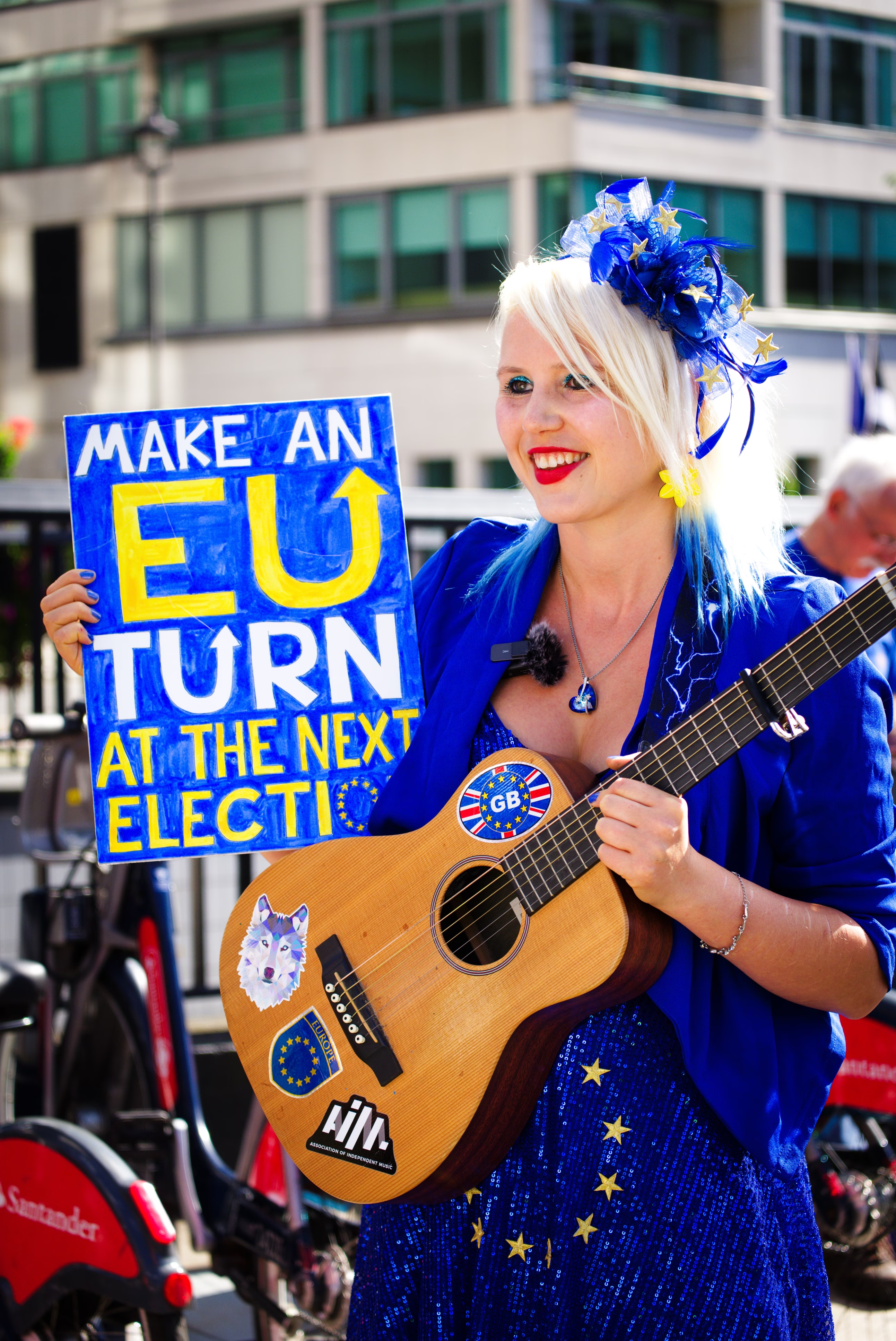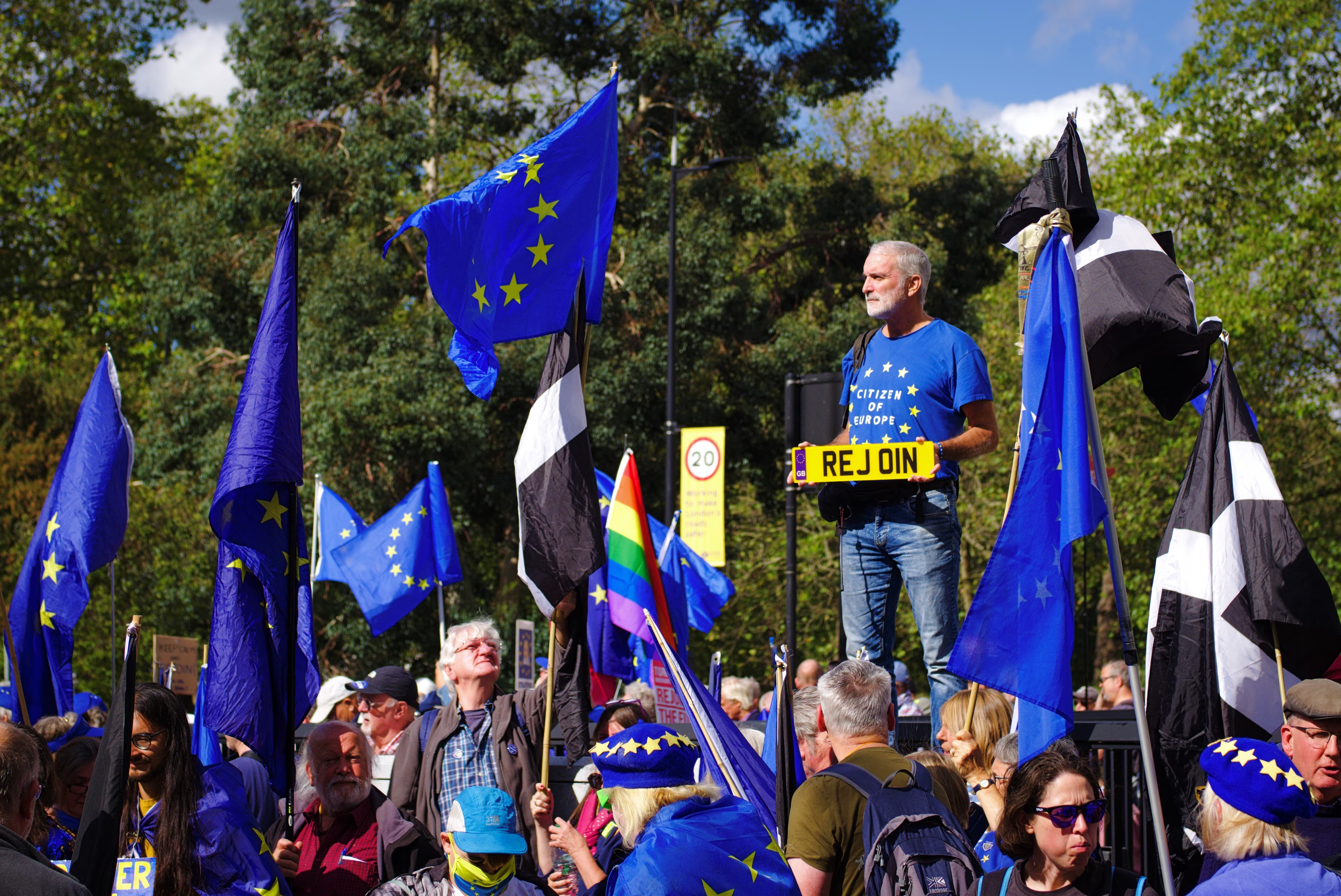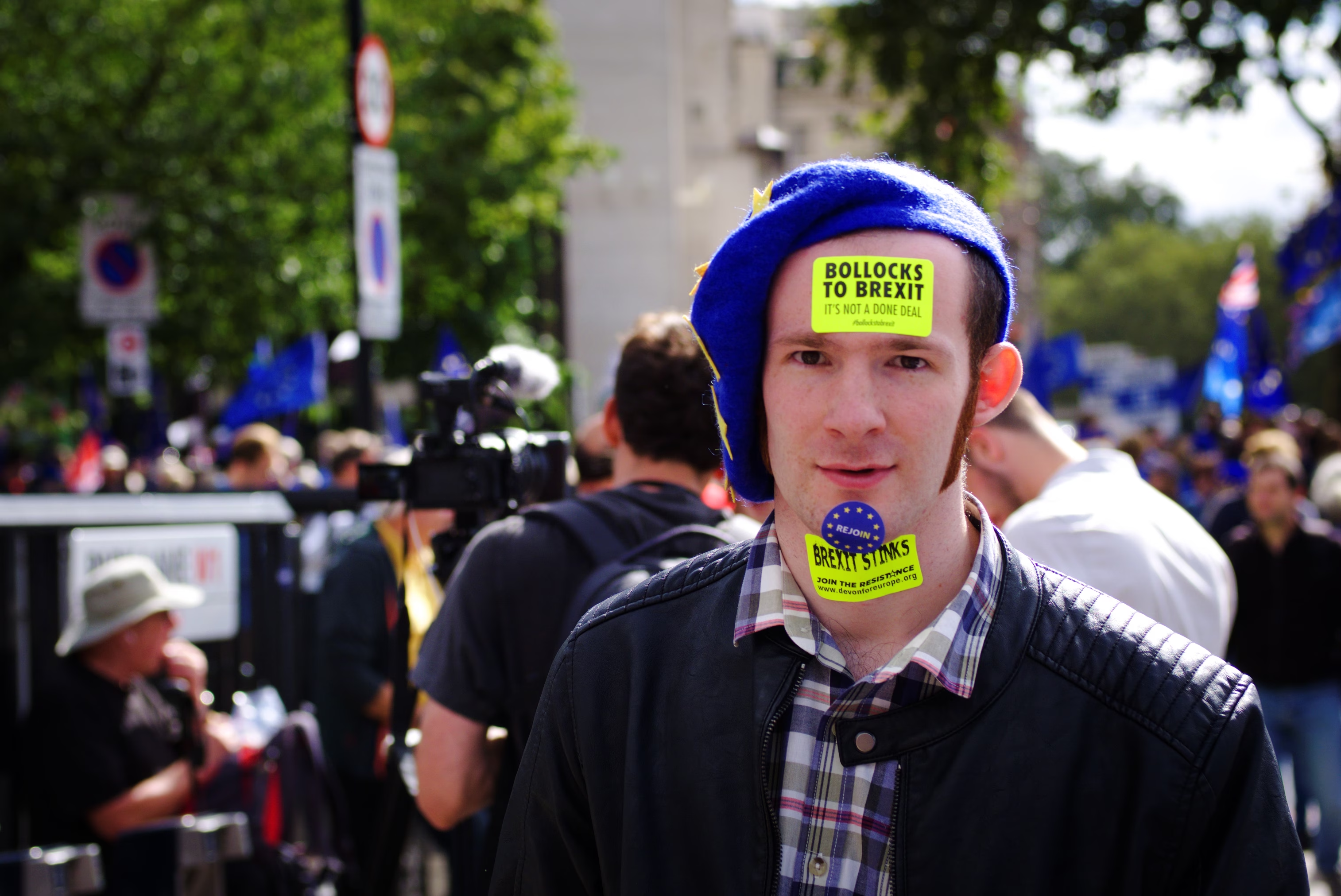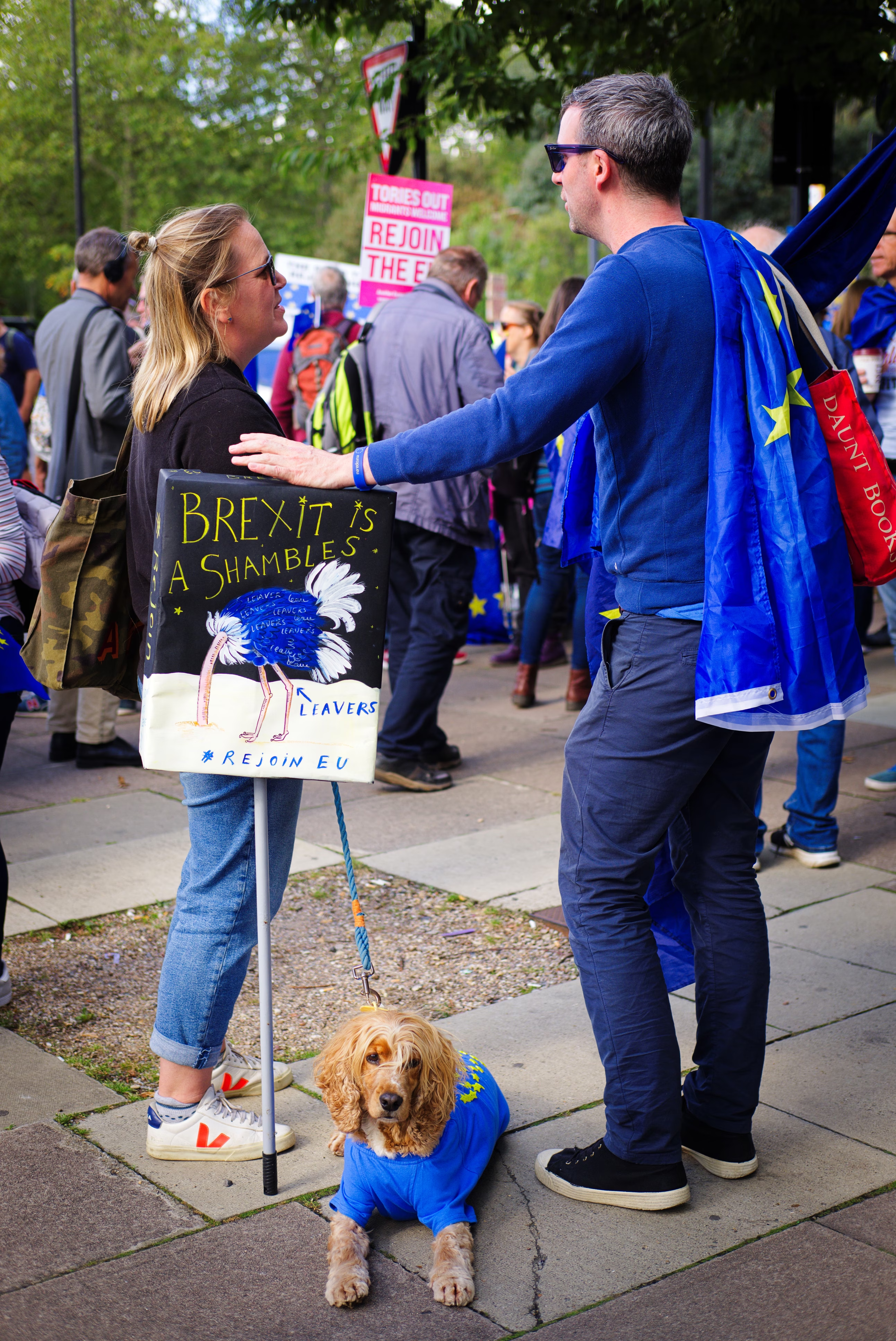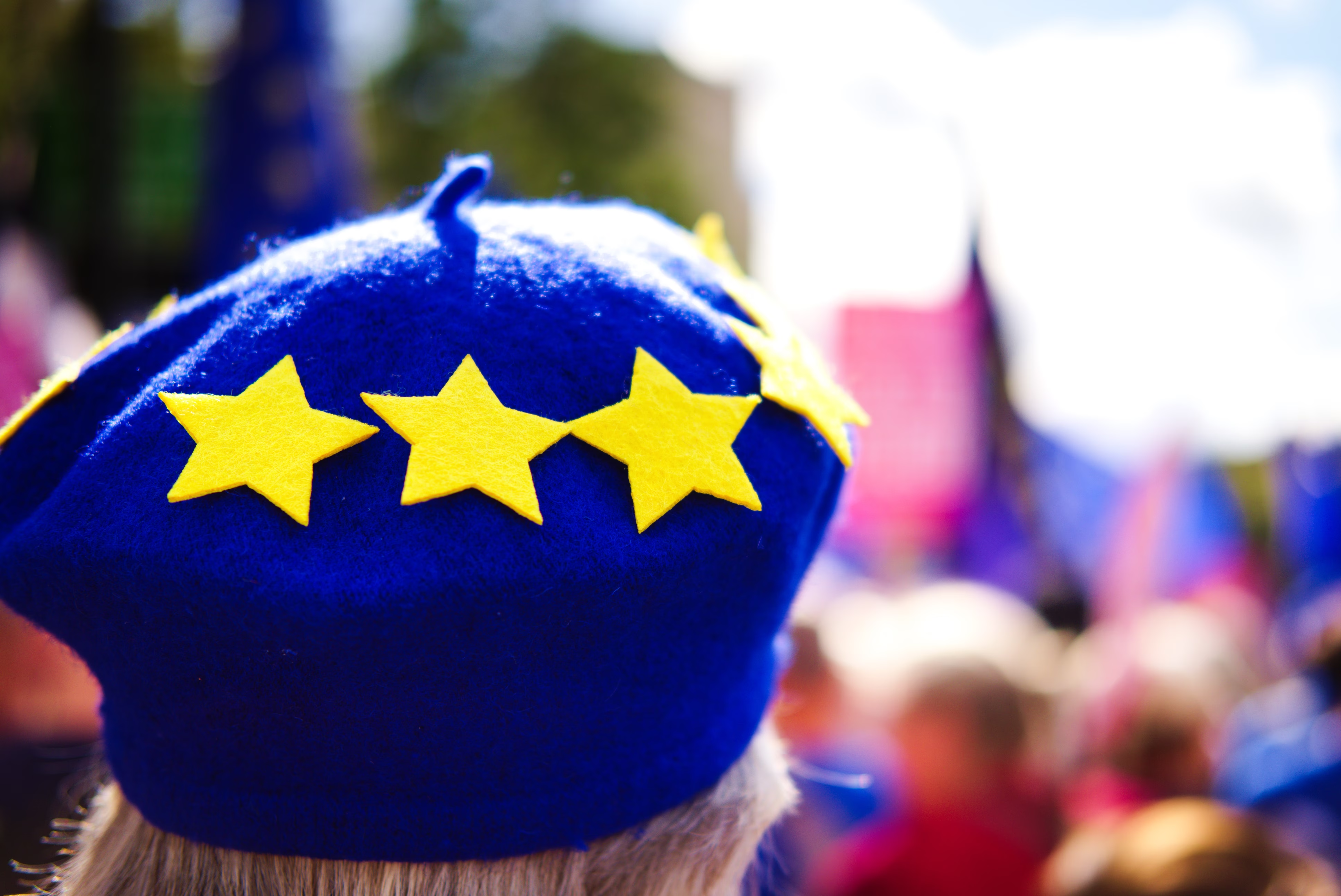
I attended the second National Rejoin March (NRM) a couple of weeks ago, having dusted off my old EU paraphernalia, stared at myself in the mirror, and mustered the energy to get back to the ultimately hopeless cause of protest.
Shaking off the hopelessness of it all wasn't easy this time around. All of the pain and sadness of our previous failures to prevent brexit or blunt its worst excesses have a numbing effect on any inspiration I have to reopen those old wounds and fight those old battles again. I have other causes I'm enthusiastic about now, other things I can focus on with much better prospects of achieving positive change — not least my party's incredible renaissance, promising an end to the current Tory hegemony and their seemingly unending reign of malaise and decline. Did I really want to go back to the old cause, the old lost cause, the great democratic failure of our time?
Apparently so. Recent polling on the issue provided a glimmer of something to cling to. 60% of voters want to rejoin the EU, and 85% of under 25s want to. That's real, something that genuinely does inspire a little bit of hope. A forlorn hope still, but hope nonetheless.
So, feeling somewhat naked with just my one current camera on me, I went.
Blue
I arrived early and sat in Hyde Park having breakfast. Adorned in an EU T-shirt, I got talking to an older protester similarly attired who assured me that the issue was settled. It was just a matter of time, he said, before his generation dies off and my generation takes over as a democratic majority. I resisted the urge to tell him I was closer to his generation than the one that'll actually see that future through.
Due to an organisational mix-up, the protest didn't actually start at Hyde Park, but across the road outside the Hilton hotel. If not for the sea of Velvia-appropriate blue everywhere, it might have seemed like the Hilton brand had been responsible for something truly heinous to warrant such a protest.
That sea of blue was modest at first. For a while, I thought I'd erred in spending so much on the train ticket down, wondering if there'd only be a hundred or two protesters at this march. I wandered around chatting to folks and shooting. I saw Gina Miller and a cohort from her True and Fair Party, and Madeleina Kay being fawned over by journalists and photographers as she played pro-EU songs.
Then seemingly very quickly, as the time for the march's kick-off approached, the sea of blue seemed to explode. There were people everywhere, and I was running around desperately trying to capture every shot that looked visually interesting that I could.
Immediately I missed my other cameras. There are few cameras out there that rival the X-T5 I had with me, but rapidly jumping between lenses in such a crowd was utterly infeasible, and became much harder once the march started in earnest. I missed the X-T4 I normally kept slung to one side and the X100V I usually kept in hand for close shots as I weaved through the crowd. Instead, perhaps learning a lesson in the process, I found myself shooting with the widest lens I had with me, a 35mm f/2, almost all day. Gosh, I miss the X100V, and can't wait for its successor.
Vibes
I didn't attend the first NRM march. I don't think I could muster the enthusiasm for it then, but after attending repeated marches and protests opposing brexit (and, in the same era, Trump), I had a good idea of what to expect.
Still, it took me a while to realise that something did feel different about this event. At first I thought it was that same sort of forlorn hope I shared, reflected in the smaller participation than those other marches. I'm not sure anyone could blame anyone for feeling such, or for choosing not to be a part of this revival of an issue they've moved past. That wasn't the whole of it though. Rather, I noticed early on that this crowd was not like those other crowds. This one was older.
I think the last big protest I'd been to was in October 2019. That one had felt forlorn too, with defeat at the looming election looking certain given the opposition's chaotic ineffectuality and deep silliness, and the outcome for brexit looking all but certain. Regardless, the crowd then was dominated by younger people, the demographic for who brexit mattered most.
This time though, I saw barely any young faces. I was a protester and a photographer, sometimes marching at pace, sometimes running ahead and alongside the crowd to hunt for my shots. I was mostly near the front, though made a good effort to move back and forth throughout, and as we arrived at Parliament Square I took the opportunity to walk back along the length of the march, looking for more opportunities to shoot.
The numbers were impressive, my earlier worries about turnout having proven unfounded, but I couldn't get away from the realisation that it was an older crowd. Everyone I spoke to was lovely, of course, being of a similar mind to me on the EU, on liberalism more generally, and seeming to generally be on board with the idea of building a better world, but I couldn't shake the sense that this seemed like just a nice day out for many.
Every peaceful protest is fun, every movement has its in-groups, and every such event has its share of silliness, but I got the sense that this wasn't serious as I watched break-dancers stop in the street to perform to Ode to Joy as protesters gathered to watch.
Alternative Movements
Sullen and feeling a bit lost, I wandered back toward Trafalgar Square to take lunch — and I'm very glad I did. In doing so I bumped immediately into a large anti-ULEZ gathering crowding the area, comprised of what seemed to purposely be the most environmentally-unfriendly vehicles they could muster.
While there, a group of — I'm not sure how to describe them — pro-Trump anti-vaccine protestors appeared. I'm not sure what they were specifically protesting, but they found some affinity with the noisy ULEZ protesters, seemingly admiring the vaguely racist characterisations of Sadiq Khan they had on display.
After lunch, I followed another large protest group that I'd seen at a few locations throughout the day, that one organised around saving the soon-to-be-banned Bully XL dog. At first I took several shots that I thought would end up great, but some twist of my ethics kicked in shortly after and I put my camera away.
I have many 'rules' I live by when I'm shooting people in public, some to guide how I work and some to limit how I work. The two most prominent are:
- A photograph must be visually interesting, and,
- Never take an unkind photograph.
The former is the one that sits in my mind every second I have a camera in my hands. A photo can't just be technically brilliant, nor can it just be dominated by subject. If it's not visually interesting, nobody is going to care about it and its place as a piece of artistic expression is always going to be limited.
The second is the constraint I live by when choosing what not to shoot. Some of it is a hard constraint. I will not shoot the homeless or other vulnerable folks, nor folks in distress or in circumstances that would make my photograph mean to them.
In both cases there are circumstances in which I'd compromise on them. If I were a photojournalist, I likely wouldn't follow either of those rules. If someone was in a vulnerable or depressing position that I thought people should see (say, someone being arrested, or a crime in progress) or where I thought the artistic expression was important enough to override my ethical constraint (would that I ever get good enough for that ever to be the case) then I'd likely abandon both rules then too.
Simply, those two rules led me to not want to photograph that protest. The only subjects there that were visually interesting would've resulted in me taking unkind photographs.
(Incidentally, the NRM march had an abundance of dogs participating, most attired in EU flags — yet I saw none at all at the Bully XL protest.)
I followed that protest back down Parliament Street where they were crowded by police officers trying to steer them away from a bizarre protest taking place against the arrest of former Pakistani Prime Minister Imran Khan. I struggled to get by, caught as I was on the wrong side of the fray, and the police being very cautious about trying not to let the two protests collide (the Bully XL one was, to put it politely, somewhat insensitive to the other protest's cause) while also keeping them away from the NRM event in Parliament Square.
Hope, Despair, and Cynicism
I missed the first few speeches on my little detour, but returned in time to see Guy Verhofstadt give a rousing speech on Britain's place in Europe. I genuinely enjoyed his talk, being both strong and timid, acknowledging the difficulties and the pain we here feel while also giving a vision for a better world.
The others were of varying quality, punctuated by marketing videos that felt crass and hollow. I found myself again wondering about the unseriousness of much of this. I'm not sure why some of them felt the need to speak, or what point they were making outside of the cheap and easy insults and hand waving directed at Westminster Palace.
As if to consolidate my cynicism, on came someone I didn't know, an ageing rocker there to play 'The Rejoin Song', that he took delight in suggesting we'd all want to sing along to. The song was as cringeworthy as one might imagine, with a video overlaying scenes from previous protests with convenient prompts for the lyrics, sometimes accompanied by guest vocals from apparently prominent figures in the movement. He even came back after one of the speakers to interject and remind the crowd that his songs were available on Spotify. Oh, if I could die of second-hand embarrassment I wouldn't be here now.
And then the gravity of the situation came back as Stella Mavropoulou spoke about how much she loved living in Britain but would be forced to leave as soon as she finished her masters degree, as other young speakers spoke about having their futures decided for them when they were too young to vote, and Mike Galsworthy of Scientists 4 EU — albeit enjoying some exuberance at our recent rejoining of Horizon — stressed the importance of our future scientific relationship with the EU.
A mixed bag, for sure, but the highlight for me was of course in seeing AC Grayling speak. I've seen him speak many times and very much enjoy his books. In one, he frames a question in terms of what a Martian might think of a particularly absurd subject without the social and cultural acceptances that we go along with. It's a delight to read as it shreds away the reader's implicit assumptions about the subject.
In a similar vein, the esteemed philosopher asked at this rally, "Why the delay?" He recounted quite fairly the positions of various political leaders, journalists, and commentators on the feasibility of rejoining the EU and asked us to examine why it's not possible for us to rejoin now, or to begin the process of rejoining now. I like the exercise of thinking that through, particularly in light of the polling that suggests an overwhelming majority in favour of rejoining now. The answer is that there isn't a good reason why we shouldn't be rejoining now, just a bad one: politics.
So much of everything we might want to do comes down to how and when we're able to achieve it. It's a point lost on many in my party, I think, that it's not enough to just express what you want. You must also implement it, and that necessitates a plan to navigate the politics of the day toward being able to. In that vein, I see no realistic way in which rejoining could be feasible in the near term, likely not within even the next parliamentary period — though I think we can fairly have hope for the one after that.
A Day of Contrasts
I stayed at the event after the speeches stopped. The crowd dissipated quickly and I sat scribbling notes, thinking about how I felt.
I note that this event had done a really good job at staying a broad church, something other protest movement often fail at. Other anti-brexit protests had speakers and messaging explicitly associating themselves with Labour, or, perhaps ironically, with Corbyn. Sometimes they actively disparaged figures outside of one particular party or group or political alignment.
This one didn't, for the most part. There were one or two mentions of rejoining as being a vehicle to end austerity, to support striking workers, to combat poverty and the like — all things that can and should plausibly appeal to everyone who supports rejoining the EU — but nothing quite so overt as to alienate significant numbers of supporters.
As I left, I wondered at what this movement was. It seemed older than previous iterations, and less serious than I'd like, but these were undeniably 'my people'. I hardly heard a word I disagreed with all day, surrounded as I was by like-minded, liberal, democratic advocates of a better future.
Still, it didn't feel to me like the high-minded discussion of ideas I somehow still hope for. This is one of the most important issues of our time, one that'll shape our next century, and two halves of our country are wildly divergent on a critical matter that has been and is being debated at every level of discourse — and the part of it I'm involved in and feel a huge degree of affinity for is the one that comes with an 80s-era theme song.
I wandered back up Parliament Street, past Downing Street on one side and an Ukrainian protest against Russian conquest on the other. I usually shoot the pro-Ukraine protests at home in Cardiff on Saturdays, but had skipped it to attend this march. The gravity hit me again, listening to them speak about their harrowing ordeal. I decided not to take any photographs.
